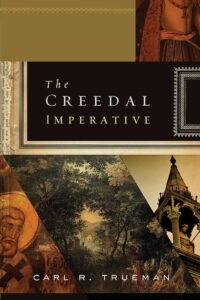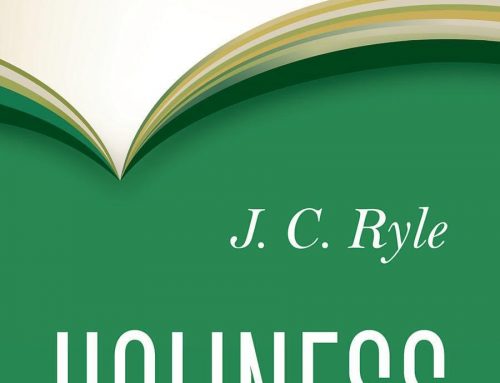The Creedal Imperative

Author: Carl R. Trueman
Publisher: Crossway
Year published: 2012
Number of pages: 205
Introduction
In Acts 2:42, one of the four means of growth and discipleship that characterizes the newly born Christian church is “the apostles’ teaching.” This one seems to be listed first for good reason, that it is the foundation not only of the other three means but of the church’s very existence. If the church is indeed “built on the foundation of the apostles and prophets, Christ Jesus himself being the chief cornerstone,” (Eph. 2:20) then we need to ask two critically important questions. First, what is this apostolic teaching? And second, how are we to learn it and pass it on to the next generation? A very helpful yet accessible book, available in the Woodgreen library, that seeks to answer these vitally important questions is The Creedal Imperative by pastor emeritus, church historian, professor, author, and podcast cohost Dr. Carl Trueman. Originally published in 2012, it has now been republished in 2024 by Crossway under the title A Crisis of Confidence. This new edition contains a chapter of new material based on two of Trueman’s other books, Strange New World and The Rise and Triumph of the Modern Self. However, the rest of this review will focus on the 2012 book.
Summary
As can be guessed from the title of his book, Trueman argues that the answer to the two questions posed above is the right use of historic creeds and confessional statements by the church. Such documents provide both a summary of essential apostolic teachings as well as, in the words of the apostle Paul to Timothy, “a pattern of sound words” by which such teachings can be faithfully passed down to future generations (2 Tim. 1:13; 2:1-2). However, powerful cultural forces have combined to undermine the use of creeds and confessions among the overwhelming majority of Protestants, even among those denominations who proudly claim to follow in the footsteps of the 16th and 17th-century Reformers, both in theology and discipleship practices. Reformed discipleship is rooted in both Lord’s Day worship and catechetical instruction. Trueman makes the case that creeds and confessions serve a vital role in both endeavors. After dissecting said cultural forces, (such as a devaluation of the past and antiauthoritarianism, among others) and then demonstrating how the New Testament itself strongly seems to anticipate the need for creedal statements, Trueman gives an overview of the development of the ecumenical creeds of the ancient church and the confessional documents of the Protestant Reformation. He then switches gears in the last two chapters to argue for their usefulness in both the liturgical and discipleship practices of the modern church. He makes a persuasive case that, despite the objections, present-day ignorance, and in some cases, even outright hostility of the vast majority of 21st-century believers towards creeds and confessions, the over-used mantra of “No creed but the Bible!” has no place among Christ’s body at any point in her history.
Critique
To a 21st-century evangelical church awash in the idols of platforms, programs, materialism, marketing and false gospels, Trueman’s book is both a breath of fresh air and a pastoral summons back to the green pastures, still waters, and paths of righteousness of Psalm 23. The reader is invited to the table of truth and nourishment that Christ has prepared for his body on earth amid her enemies. Writing with his characteristic clarity and humility, Trueman also demonstrates a brilliant understanding of culture and how certain cultural forces directly affect the church’s theology and ecclesiology (doctrine of the church). He doesn’t waste any time; the book contains little to no filler, nor does he beat around the bush. His book is an excellent example of speaking the truth in love; he does not hesitate to call out the foolishness and fallacies that characterize Western culture and much of the evangelical church, while also acknowledging the legitimacy of certain aspects of said cultural forces that create hesitancy or even hostility towards creeds.
Trueman’s book is, of course, not without its flaws. His writing style can seem somewhat heavy at times, and his section on the Athanasian Creed in chapter 3 isn’t very clear or helpful. He also repeats himself a lot. Nevertheless, his work is an excellent primer on the historic creeds and confessions of the church and the imperative urgency with which the church needs to return to them. This book is geared towards adults, although older teens should also be able to handle it, especially those youth who find themselves hungering for a deeper means of discipleship. Parents of young children will also find immense benefits in reading it as a starting point for a tried-and-true method of obedience to Paul’s words to “bring their children up in the discipline and instruction of the Lord” (Eph. 6:4) from a young age.
Reviewed by Warren Leigh



